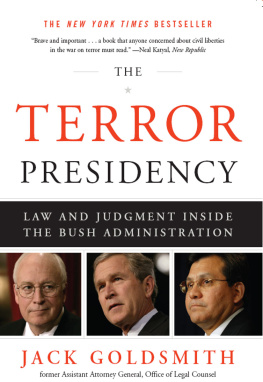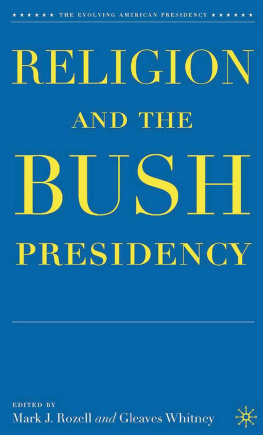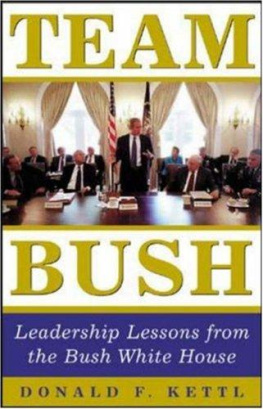Justin A. Frank, M.D.
I F ONE OF my patients frequently said one thing and did another, I would want to know why. If I found that he often used words that hid their true meaning and affected a persona that obscured the nature of his actions, I would grow more concerned. If he presented an inflexible worldview characterized by an oversimplified distinction between right and wrong, good and evil, allies and enemies, I would question his ability to grasp reality. And if his actions revealed an unacknowledgedeven sadisticindifference to human suffering, wrapped in pious claims of compassion, I would worry about the safety of the people whose lives he touched.
For the last three years, I have observed with increasing alarm the inconsistencies and denials of such an individual. But he is not one of my patients. He is our president.
So began the introduction to the original edition of Bush on the Couch . Published in mid-2004 with the presidential campaign in high gear, Bush on the Couch took a close look at the personality that emerged in Bushs first term and found cause for alarm. Since then another three years have passed, and the alarm has grown both in intensity and reach. In the weeks and months after the 2004 election, more and more Americans began waking up to the fact that our president is at best peculiar and more likely, unstable, perhaps even mentally disturbed; by 2007, much of the nation was wide awake to that troubling prospect. By undertaking a rigorous, independent psychoanalytical study of a sitting president facing reelection, Bush on the Couch became one of the tools in this process of enlightenment, helping observers observe, critics criticize, opponents organize, and analysts analyze their thoughts. But as we move into the second half of his second term, it is tragically clear that the contours of the presidents psyche have not changed.
George W. Bush remains a case study in contradiction. We have all witnessed the affable good humor with which he charms both supporters and detractors; even those who disagree with his policies may find him personally likable. As time goes on, however, the gulf between his personality and those policiesand the style with which they are executedgrows ever wider, raising serious questions about his behavior:
- How can someone so friendly and playful be the same person who cuts funds from government programs aiding the poor and hungry?
- How can a commander in chief who puts military personnel in harms way and extols their courage cut their health-care and housing funds once they return?
- How is it that our deeply religious president feels free to bomb Iraqand then celebrate the results with open expressions of joy?
- How can a president who invades a sovereign nation under false pretenses joke about that deception, finding humor in the absence of weapons of mass destruction under his Oval Office desk?
- How can a self-proclaimed uniter act so divisively as to appoint a rejected Swift Boat contributor to an ambassador post?
- How can a president who touts his consistency and leadership pledge to rebuild New Orleans and then turn his back on his promise?
- How can this man who insists on punctuality among his advisers be so late responding to threats and disasters?
- How can the president sound so confused and yet act so decisively? And, given the regularity with which he confuses fact with fantasy, how can he justify decisions based largely on his own personal suspicions with such unwavering certainty?
As a citizen, Ive worried about what these contradictions and inconsistencies say about the presidents ability to govern; as a psychoanalyst, Im troubled by their implications for the presidents current and long-term mental health, particularly in light of certain information we know about his past. Naturally, the occasional misstatement or discrepancy between word and deed may be dismissed as politics as usual. But when the most powerful man on the planet consistently exhibits an array of multiple, serious, and untreated symptomsany one of which Ive seen patients need years to work throughits certainly cause for further investigation, if not for outright alarm.
President Bush is not my patient, of course, but the discipline of applied psychoanalysis gives us a way to make as much sense of his psyche as he is likely ever to allow. At its simplest level, applied psychoanalysis means the application of psychoanalytic principles to anybody outside ones own consulting room. The tradition of psychoanalyzing public figures dates back almost as far as psychoanalysis itself; Freud based some of his most important theories on his observations of individuals he could never get onto his couch, Moses and Leonardo da Vinci most notable among them.
Indeed, if Freud were alive in the second half of the twentieth century, he might well have been recruited to offer his genius in the service of the U.S. intelligence effort. Somewhere in the bowels of the George H. W. Bush Center for Central Intelligence in Langley, Virginia, psychoanalysts are currently reviewing audio recordings, videotapes, and biographical information on dozens of contemporary world leaders, using the principles of applied psychoanalysis to develop detailed profiles for use by the CIA and the U.S. government and military. According to political psychiatrist Jerrold M. Post, M.D., who has chronicled the history of at-a-distance leader personality assessment in support of policy, the marriage of psychoanalysis and U.S. intelligence dates back to the early 1940s, when the Office of Strategic Services commissioned two studies of Adolf Hitler. The effort was regarded as successful enough that it was institutionalized in the 1960s, Post writes, first under the aegis of the psychiatric staff of the CIAs Office of Medical Services, which led to the establishment of the Center for the Analysis of Personality and Political Behavior (CAPPB), which Post founded within the Directorate of Intelligence.
As Post reveals, CIA psychological profiles of Anwar Sadat and Menachem Begin played an important role in Jimmy Carters handling of the 1978 Camp David negotiations. And applied psychoanalysis continues to enjoy a privileged place in the intelligence universe. At the time of his confirmation hearings, Secretary of the Defense Donald Rumsfeld identified as his nightmare [the possibility of] not understanding the intentions of dangerous adversaries, Post writes. Accentuated by some of the recent intelligence surprises, the need to have a robust applied political psychology capability has been highlighted and increased resources are currently being applied to human intelligence and to the study of the personality and political behavior of foreign leaders, both national leaders and terrorists.
A vote of confidence from todays CIA, of course, might be described as a mixed blessing. Nevertheless, applied psychoanalysis remains a vital tool for understanding political leaders. And since one can scarcely imagine Bush Center resources being committed to a Bush sons psychological profile, this must be an independent inquiry, albeit one that is informed by the CAPPB goal as articulated by its founder, Jerrold M. Post: to understand shaping events that influenced core attitudes, political personality, leadership, and political behavior.










